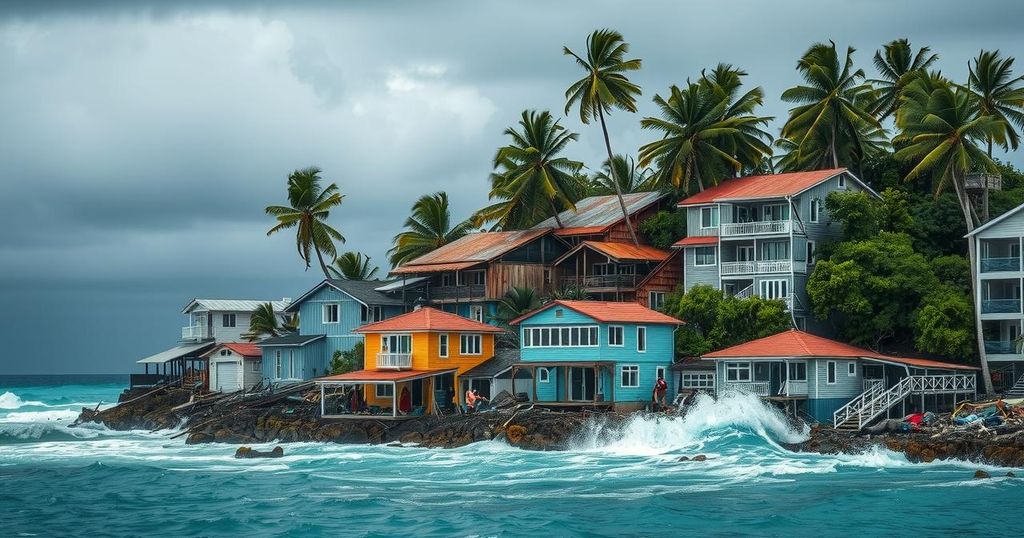Cyclone Chido has caused catastrophic devastation in Mayotte, France, feared to have claimed hundreds of lives. As a Category 4 cyclone, it left destruction in its wake with damaged infrastructure, limited access to aid, and ongoing search and rescue efforts. The impoverished island faces significant humanitarian challenges as residents begin to rebuild amidst urgent needs for food, water, and medical supplies.
Cyclone Chido has devastated Mayotte, a French territory located in the Indian Ocean, leading to significant fears of casualties, with estimates suggesting that hundreds may be dead. The cyclone struck as a Category 4 storm, the second most severe classification, causing unprecedented destruction. Official assessments are hindered by downed infrastructure and ongoing search efforts for the missing. Minister Bruno Retailleau reported that establishing an accurate death toll will take considerable time, as rescue operations face substantial challenges. The island, already struggling with poverty, is in dire need of international assistance to recover from this catastrophic event.
As the situation unfolds, survivors describe a landscape of chaos, with total destruction in the capital, Mamoudzou, where vital facilities including schools and hospitals were obliterated. Reports indicate that the airport has been severely damaged, further complicating rescue operations, as military aircraft remain the only means of transport to deliver aid. Authorities are grappling with widespread power outages and an acute shortage of drinking water, raising urgent concerns about the health and safety of the affected population.
Numerous citizens ignored storm warnings, leading to additional loss. Those residing in makeshift shelters remained, fearing theft, while many undocumented migrants avoided shelters due to fears of deportation. The French Red Cross has described the level of devastation as possibly “unimaginable,” emphasizing the impossibility of providing precise victim counts amidst chaotic rescue efforts.
Despite the overwhelming damage, survivors are showing resilience, beginning to rebuild their lives rigorously. Aid from the French government is being mobilized, with significant supplies dispatched from Reunion Island to support urgent needs. Local and international organizations continue to coordinate response efforts, but full recovery will require substantial time, resources, and support to restore normalcy in one of the poorest regions of the European Union.
As Cyclone Chido progresses, neighboring countries are also preparing for potential impacts while facing their own storm season challenges, which have seen numerous deadly cyclones recently.
Cyclone Chido emerged as a significant weather event impacting the Indian Ocean region, primarily affecting Mayotte, a French territory with an already vulnerable population. The cyclone made landfall during the cyclone season, which typically spans from December to March, a period characterized by heightened tropical activity. This phenomenon follows a troubling trend, with recent years witnessing destructive cyclones such as Idai and Freddy, which resulted in widespread destruction and loss of life across southern Africa and the Indian Ocean islands. Mayotte’s socioeconomic challenges further exacerbate the impacts of such natural disasters, necessitating urgent humanitarian response efforts to support recovery.
In conclusion, Cyclone Chido’s impact on Mayotte has been catastrophic, with an unclear but feared high death toll and severe infrastructure damage. The disaster has exposed the vulnerabilities of the island’s impoverished population and highlights the urgent need for effective humanitarian aid and disaster response strategies. As rescue operations continue, the resilience of the residents is commendable, yet substantial support from both local and international entities will be crucial in facilitating recovery in the aftermath of this devastating cyclone.
Original Source: weather.com






